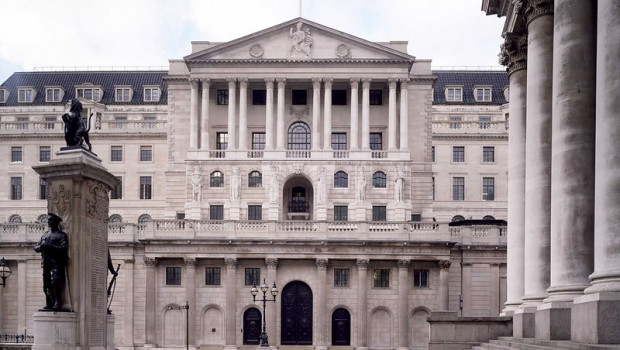BoE hikes rates to 0.75%, strikes more dovish tone

The Bank of England hiked interest rates as expected on Thursday by 25 basis points and struck a more dovish tone as it warned inflation could exceed 8% this year.
The Monetary Policy Committee voted 8-1 to lift rates to 0.75%, with only deputy governor Jon Cunliffe voting against a hike. At the February meeting, four members voted in favour of a 50 basis points hike.
This marked the third time the Bank has upped interest rates in four months as it looks to combat surging inflation and leaves rates at their highest level since the start of the pandemic in March 2020. Inflation is currently at a 30-year high of 5.5%, versus the Bank’s target of 2%.
The BoE lifted its forecast for inflation. "Regarding inflation, the invasion of Ukraine by Russia has led to further large increases in energy and other commodity prices including food prices. It is also likely to exacerbate global supply chain disruptions, and has increased the uncertainty around the economic outlook significantly," it said.
"Global inflationary pressures will strengthen considerably further over coming months, while growth in economies that are net energy importers, including the United Kingdom, is likely to slow.
"Inflation is expected to increase further in coming months, to around 8% in 2022 Q2, and perhaps even higher later this year." The last time inflation breached 8% was April 1991.
The minutes from the latest meeting were slightly more dovish than the market had been expecting. The bank said that based on its current assessment of the economic situation, "some further modest tightening in monetary policy may be appropriate in the coming months, but there are risks on both sides of that judgement depending on how medium-term prospects for inflation evolve".
Previously, it had said some further modest tightening in monetary policy was "likely" to be appropriate.
The BoE's more dovish tone knocked sterling, which by 1255 GMT was trading down 0.4% against the dollar at 1.3096.
Samuel Tombs, chief UK economist at Pantheon Macroeconomics, said: "Today’s minutes leave us more confident in our view that the rate hiking cycle will stall after the Committee increases Bank Rate to 1.00%, most likely at the next meeting in May.
"GDP data for April will be available at the Committee’s following meeting on June 16. The huge hit to households’ real disposable incomes in April from rising energy prices and higher taxes likely will immediately weaken retail sales and consumer services expenditure. We look for a 0.2% quarter-on-quarter drop in GDP in Q2, reflecting a squeezed consumer, as well as declining government expenditure, as Covid-19 testing and vaccinations are wound down, and the extra bank holiday in June. Admittedly, the MPC will focus on the underlying inflation outlook too."
Victoria Scholar, head of investment at Interactive Investor, said: "At the previous meeting the MPC was divided over whether to carry out a 0.25% hike or go for a double 0.5% rate hike, narrowly favouring the former. However last month’s hawkish dissenters fell back into line at today’s meeting, after the war in Ukraine prompted a more cautious approach amid fears of an economic slowdown."
She noted that for flexible rate mortgage holders, the cost of borrowing is on the rise, making repayments more expensive.
"For savers, ordinarily this would mean a greater rate of return on cash deposited in the bank. However unfortunately with inflation at a 30-year high of 5.5%, savings are being wiped out by rising price levels with the real rate of return on savings in the bank still in decline."